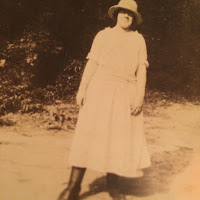 |
| Baby boomer as artist in smock. |
Our generation is the result of a tremendous post-World War II U.S. economic surge, coupled with the optimism and relief that fascism had been vanquished by American exceptionalism, and genocide in both Germany and Russia at least temporarily halted.
With all of this hope and optimism in the air, everyone wanted and most importantly -- thanks to the GI Bill and the military-industrial complex economic boom -- many were financially able to have babies.
My first memory from age 2 was watching the funeral for President John F. Kennedy on a black and white TV in a darkened room at my mother's friend Pat's house. I didn't really know what I was watching, although I identified with the grieving John John who was roughly my same age and thrust into the public spotlight by the assassination of his father.
Even at age two I could feel the nation's grief, and sense the seismic upheavals that were about to transition us from the post-war boom years into the five assassinations, protests, riots, war and cultural upheavals that marked my youth.
We boomers grew up protesting. With the assassinations of Kennedy, Medgar Evers, Malcolm X, Martin Luther King Jr. and Bobby Kennedy the optimistic progressivism of the U.S. was violently subdued by those who did not want to extend civil rights to others; by those who did not want white U.S. wealth and privilege to be shared here at home or perhaps especially abroad through Kennedy's USAID, Peace Corps, and more.
Those of us who continued to believe that vanquishing fascism with U.S. prosperity and democracy had ushered in a new era of hope, equity, diversity and inclusivity, took to the streets to fight these reactionaries and their lies.
We believed in a common good, in community over profits, in a world in which the wealthy cared about those with less. We sought to build equity: creating cooperatives and collectives and buying land together and making consensus-based decisions. We respected and worked to nurture the environment around us, eating plant-based diets "for a small planet" and advocating for the Clean Water Act and the EPA. We fought and fought for civil rights for all -- people of color, women, queers, trannies.
 |
| A collective Friendsgiving in the 1980's. |
And ultimately against the holocaust of discrimination and death that was the AIDS crisis in the 1980's U.S. during the Reagan regime.
Sadly, the forces of conservative reaction remain very much with us today worldwide, spearheaded in the U.S. by new figureheads -- Trump & Musk.
I might argue that these reactionaries to equity, diversity, and inclusivity for all would of course remain with us. That those who disproportionately hoard privilege and power at the expense of others remain in every society throughout history; and that history itself is a cycle of two steps forward and one step back. We never lose all the ground we've gained, but the regressions are painful.
I could argue that we underestimated the insecurity of white men around the globe to the extent that they now have to scream it at us in what would be comic ways if they were not so well armed for violence. Really, how did we end up in this reality TV show of racist masculinity?!
But what I want to argue is that we are here in large part because my generation, the boomers -- really one of the wealthiest and most privileged in American history -- have failed our next generations.
 |
| Woodsbians 1980's. |
Too many of us became enamored with the creature comforts of wealth and privilege -- which is to say, exalting the individual over the common good.
We allowed capitalism to seduce us as we aged to the point that the Democratic party that once best represented our progressivism has become known as the party of the "liberal elite" rather than that of labor and the poor. In the 1990's, Democrats allowed our unions to be broken and our social safety nets to be diminished. We got in line behind the free market "neoliberalism" of NAFTA.
 |
| NYC Pride March 1990's |
Truth lies behind every stereotype. Yes, the conservative agenda has used the label of "liberal elites" to tarnish progressive democracy.
But it couldn't be tarnished without the truth that lies beneath it.
We boomers have some accountability for where we are, and we have not only to acknowledge it but to re-present and insist on our vivid, ethical, equitable vision for the future.
Where is our moral leadership? Where is the big vision of "liberty and justice for all" we need to rise above the financial bureaucracy and meritocracy we've instead and reductively held up as goals?
 |
| A new feminist collective for a new century |
My generation has fallen down on the job and it's time to pick ourselves up, dust ourselves off, and support the young people who want to move into the more just future we once embodied and probably still -- speaking for myself -- believe in.
We are going to have to give up some creature comforts, take some risks, and face some uncomfortable truths to get there.
It's not how I thought I'd spend my old age. But.
Time to stop texting and to breathe embodiment back into our beliefs. "Love" is not merely a nice warm feeling between individuals: it's embodied action for love of others and this world.















